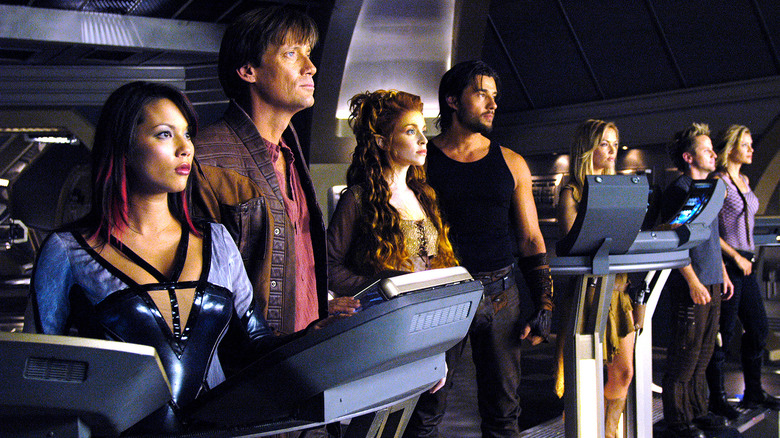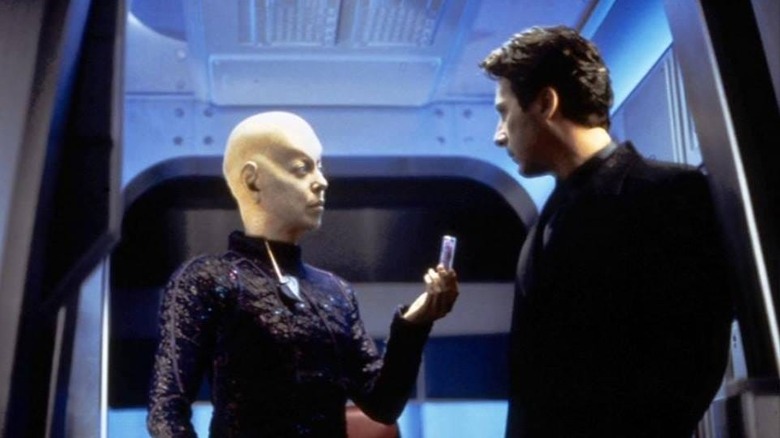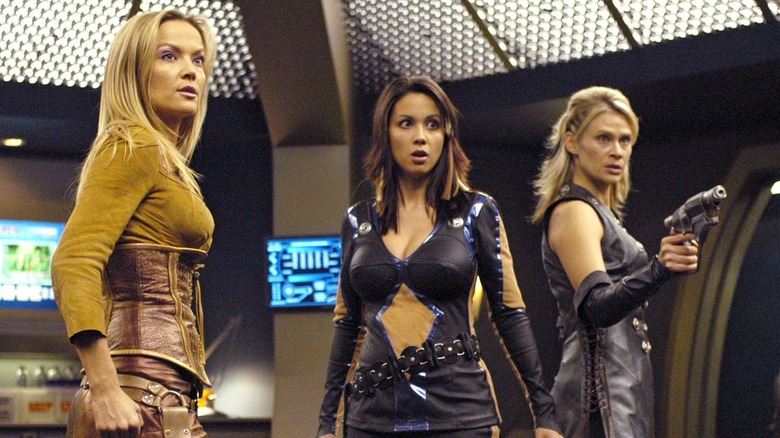Star Trek's Gene Roddenberry Created Two Forgotten Sci-Fi Shows Years After His Death
Gene Roddenberry was working as a Los Angeles cop in the mid-1950s when he began his writing career. He flew planes in the army during WWII, and famously survived three plane crashes. He was a commercial airline pilot for a spell before joining the LAPD. This is a wild backstory for a TV writer who would become best known for utopian science fiction. By the time he was a cop, "Star Trek" was still about a decade away.
Roddenberry's first writing gigs were, perhaps predictably, for crime shows like "Highway Patrol" and "Mr. District Attorney." For the bulk of the '50s and '60s, he contributed to the hit Westerns of the day, writing 24 episodes of "Have Gun — Will Travel," and one-offs of "Wrangler," "Whiplash," and "Boots and Saddles." He was a Tinseltown journeyman.
Along the way, Roddenberry wrote several pilots for TV shows that were never picked up. All of his ambitions pointed toward crime shows, military shows, and Westerns like "Sam Houston," "The Night Stick," "Defiance County," and "A.P.O. 923." Not only was "Star Trek" Roddenberry's first sci-fi project, but it was the first he managed to bring to air. After 15 years of struggle, he made a name for himself.
It took another few years, but "Star Trek" took off. As we know, it is a cultural institution to this day. Roddenberry shifted his focus to sci-fi, and began writing pilots for new sci-fi shows. Weirdly, none of Roddenberry's post-Trek pilots took off. Only "Star Trek: The Next Generation" was a hit. After Roddenberry died in 1991, his family began digging through drawers, and found other sci-fi shows he had constructed but never pitched. His estate ended up pitching the shows posthumously, and the world was treated to two notable new sci-fi shows that kept the legacy going. Genre nerds are likely very familiar with "Earth: Final Conflict" which debuted in 1997, and "Andromeda," which debuted in 2000.
Both shows are actually kind of okay.
Earth: Final Conflict ran longer than you'd expect
The first of the two posthumous Roddenberry shows was "Earth: Final Conflict," which came at a time when "Star Trek" was still riding high. The hit film "Star Trek: First Contact" had come out the previous summer, and both "Star Trek: Deep Space Nine" and "Star Trek: Voyager" were humming along steadily on TV. Another Gene Roddenberry series seemed like a good idea, even though it wasn't being handled by the "Star Trek" creative team.
"Earth: Final Conflict" was one of the sci-fi pilots Roddenberry began working on after "Star Trek" was canceled way back in 1969. The original title was "Battleground: Earth," but was eventually changed as to not be confused with L. Ron Hubbard's 1983 novel "Battlefield Earth." The premise feels weirdly timeless, and seems to be at least partly inspired by Arthur C. Clarke's novel "Childhood's End." Set in the near future, "Earth: Final Conflict" follows humanity's experiences after the arrival of the Taelons, a super-advanced alien species who have come to share their advanced technology and medicine. The Taelons' presence on Earth quickly improves humanity's quality of life, and the are often referred to as "Companions." But they are weird and secretive, and that leaves many suspicious. Are the Taelons truly benevolent?
It is eventually revealed that the Taelons have been secretly fighting a centuries-long war with another alien species called the Jaridians, and that they are slowly going extinct. The Taelons hope to survive by fusing themselves with humans. One can see the ripeness for drama and story right away.
"Earth: Final Conflict" was sold directly into syndication, and it ran an impressive 110 episodes over the course of five seasons. It never caught on as hard as "Star Trek," but it lasted longer than "Star Trek: Enterprise."
Andromeda offered a far more dystopian sci-fi vision
"Andromeda" was another project Roddenberry was working on in the late '60s and early '70s, although the premise is far more complex and modern than any of his previous efforts. It fell more succintly in line with other failed Roddenberry pilots like "Genesis II" and "Planet Earth," which bore a bleak, dystopian worldview. It seems that, after "Star Trek" was canceled, Roddnebery wasn't feeling incredibly hopeful about the world. At least "Andromeda" was about trying to rebuild, even if it took place during a spatial Dark Age.
The premise requires a little explanation. "Andromeda" begins in the distant future, when an organization called the Systems Commonwealth oversees life across the Milky Way, Triangulum, and Andromeda galaxies. The Commonwealth, like the Federation in "Star Trek," oversees a fleet of starships, and the bulk of the series takes place on the Andromeda Ascendant, captained by Dylan Hunt (the once-celebrated, now shamed Kevin Sorbo). The Commonwealth is at war with a parasitic species called the Magog, and has incurred the wrath of a cult of Nietzscheans after a bad treaty. In the pilot episode, the Andromeda flees a Nietzschean attack, and parks itself next to a black hole, freezing itself in time. 303 years later, in the year 5167, a salvage ship rescues the Andromeda and its wholly preserved crew. In the centuries they were frozen, the Commonwealth fell and the Dark Ages began. Dylan Hunt and his ragtag crew must, with no backup, rebuild what hope they can.
The goal to rekindle a utopia is a very Roddenberrian idea. Like "Earth: Final Conflict," "Andromeda" ran for 110 episodes over its five seasons, mostly popping its head up on the Sci-Fi Channel (now just called Syfy). Of course, the stories and mythology got far more complicated. "Andromeda" was overseen for a few years by Trek alum Robert Hewitt Wolf.
It's hard to say if Roddenberry would have liked these shows. Although he was happy to encounter any kind of success, so it's likely he would have been happy to see them at all.


